#society of the queer eye
Explore tagged Tumblr posts
Text
happy holidays everyone!!! i come baring gifts!! what are the gifts you may ask?
2 OPENINGS IN THE MAGMA GROUP!!!
we are a thriving “cult” now and we would love if you joined! all we ask for is someone who has artistic capabilities, has a discord (and is willing to join the server), and loves to have fun!! we do events all the time!
perhaps… we will see you there!! (dm me/comment if interested!)
#magma#society of the queer eye#definitely not a cult#totally a cult#gravity falls#gravity falls artists#artists on tumblr
0 notes
Text



We are alive. And we will continue living. So long as you remain by my side.
#dead dead demon's dededededestruction#dddd#dededede#ddddedit#anime gif#anime#animeedit#animangahive#fyanimegifs#animangaladies#shoujoaiedit#allanimations#anisource#usericybtch#userinahochi#userartless#userlysandra#usersophies#userkyaa#*gifs#man this anime is insaneeeee the brutality of how it depicts humanity??#the spectrum of different reactions society has in the face of disaster#the political conflict and misinformation and the backlash in polar extremes#the war and endless violence and othering of those we deem different#but also the apathy. the fatigue. turning a blind eye to disaster. how in the midst of it all life goes on in all of its mundanity#insane how this was written in 2014 bc it feels more relevant now than ever. but humanity remains the same despite the passage of time ig#and my favorite trope of all time. dooming the world just to save one person YESSSS#also the yuri! what a pleasant surprise! and i love how queer and gnc charas just exist. no big deal#it's crazy how it's so underrated??? sure it has some uh. questionable things but i don't think they're painted in a good light at all imo#the way this show doesn't even have an edit tag LMAO i loooove giffing the most obscure niche shows of all time it's my fav hobby <33
218 notes
·
View notes
Text
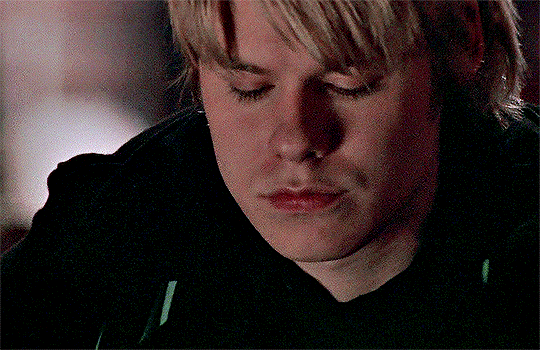
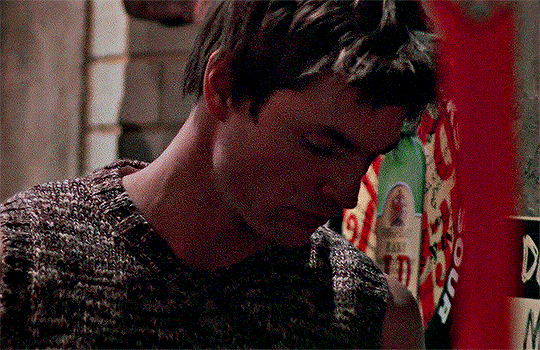
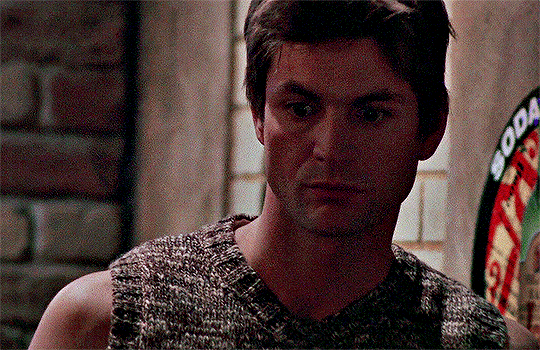
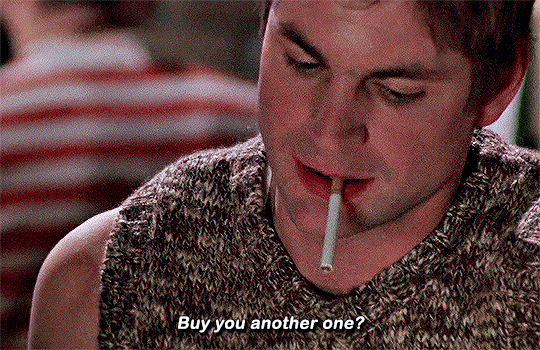
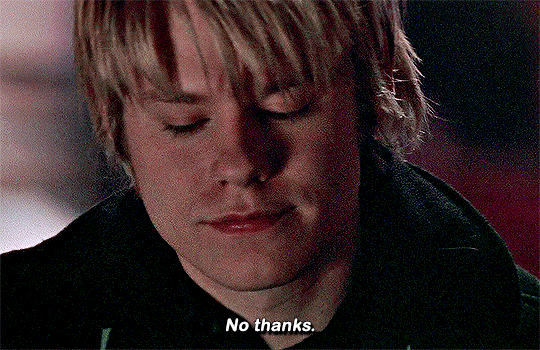
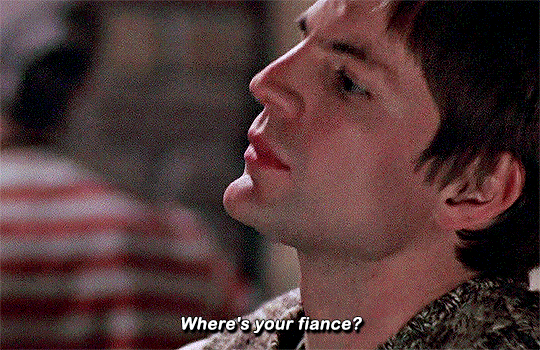
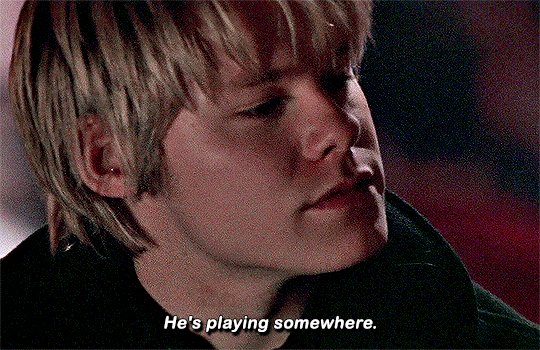
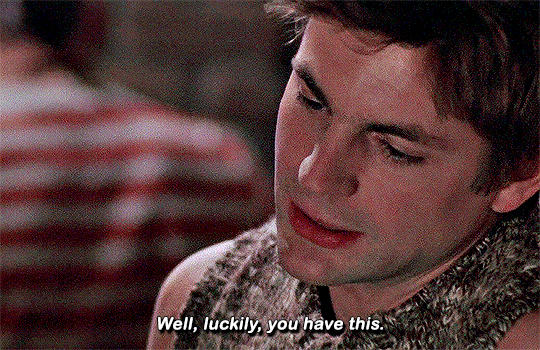
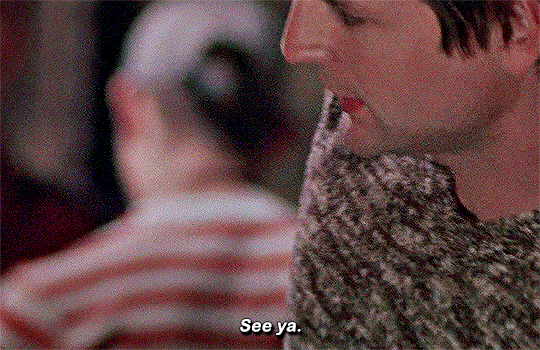
Queer as Folk – 3.06: One Ring to Rule Them All
#britin#queer as folk#cinematv#filmtvcentral#userthing#smallscreensource#userstream#dailyflicks#tvarchive#filmtvtoday#usersource#mlmsource#usergay#we as a society do not talk about this scene enough!!!#brian just instantly knowing justin is upset and even though it's not his place to comfort him anymore he still cares and is his friend#so he closes his eyes takes a deep breath and puts his game face on and goes over to offer some company#yes he still takes his chance to reiterate the hollowness of romantic gestures sometimes they are just pretty words and gifts#without the actions to back them up#brian might not say the words but his actions speak for themselves#3x06#my gifs
85 notes
·
View notes
Text
watching dead poets society with my mother and i cant make a single queercoded analysis this must be hell
#i pushed it by mentioning conformity in the metaphor (ha) of the christian church#she gave me a stink eye alone because i quickly reminded her what martin luther was fighting for (she loves the guy)#dead poets society#movies#neil perry#todd anderson#all im saying is that they totally kissed in the dorm room that 'im gonna be an actor' scene was gay as fuck#but separately the message about defying conformity really resonates with me#text post#my posts#movie about conformity and two guys who have a close friendship/little interest in women the formula is right there#as ive stated before my mom is sort of a horrible english major shes never willingly analyzed anything in her life#i hold the theory that she passed these skills on to me when she birthed me#yet another reason why i cannot have children what if i loose my passion for film and literature analysis#its especially bad bc i watch everything with a queer lens already on the camera death of the author bitch live laugh love
33 notes
·
View notes
Text
i know I've mentioned my interpretation of mizu's gender a million times on here but i don't think i ever fully elaborated on it.
so on that note i just wanna ramble about that for a bit. basically, it's my reading of the show that mizu is nonbinary, so let me dig into that.
putting the rest under the cut because it ended up being pretty long lol. also here have a cute mizu pic of her being happy and most at ease with herself, symbolised by her letting her hair down. <3 ok let's proceed.
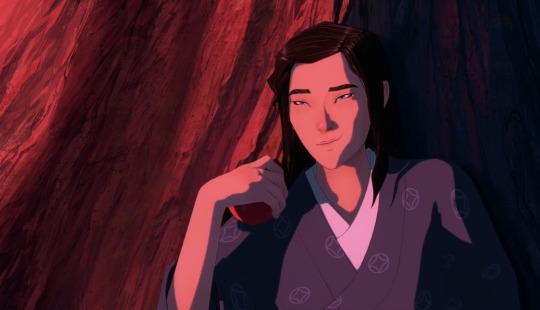
thus, when i refer to mizu as nonbinary, i am interpreting mizu as a woman, but not ONLY a woman. not strictly a woman. she is also a man. she is also neither of these things, she is something in between, while at the same time she is none of these at all. i've said as much many times, but i just don't want people to think that when i say nonbinary, it inherently means a "third androgynous gender" that essentially turns the gender binary into a gender trinary. not only is that going against what the term nonbinary was crafted for (to go against rigid boxes and categorisation of gender identities), but also, not all nonbinary people fall under that category or definition, and that's definitely not the way i interpret mizu.
okay before i go deeper i'd just like to address some important things. first of all, this post is an analysis of canon, and thus everything i am arguing for is about my own interpretation of the show, and not some baseless projected headcanon i am projecting onto the character. please remember there is a difference between an interpretation (subjective; interpretations will differ from viewer to viewer, but ultimately it is firmly rooted in evidence taken from the source material) VS a headcanon (unrelated and often even contrary to what is presented in canon; opinions wildly differ and they cannot be argued for because there is no canonical evidence to back it up).
ALSO please note that nonbinary is an umbrella term. this means that it applies to a vast range of gender identities. other identities that fall under the nonbinary umbrella include agender, bigender, genderfluid, and so on. however, it's my personal preference to use the term nonbinary as it is, simply because i'm not a fan of microlabels (more power to you if you do like them and find they suit you more though!).
also, before anyone fights me on this, let me clarify further that gender means something different to everyone. it's not your biological sex or physical characteristics. but at the same time, gender is not mere presentation. you can be a trans woman and still present masculine—either because you're closeted and forced to, or because you just want to—and either way, that doesn't take away from your identity as a woman. same goes for trans men. if you're a trans man but you wear skirts and don't bind or don't get top surgery, that doesn't make you any less of a man. because gender non-conformity exists, and does not only apply to cis people! some lesbians are nonbinary and prefer using he/him pronouns while dressing masculinely, but that doesn't mean they're a man, or that they're any less of a lesbian. neither does this mean that they're a cis woman.
the thing about queer identities in general is that, like i said, they mean something different to everyone, because how you identify—regardless of your biological attributes and fashion or pronouns��is an extremely personal experience. so a nonbinary person and a gnc cis woman's experiences might have plenty of overlap, but what distinguishes between the two is up to the individual. there's no set requirements to distinguish you as one or the other, but it's up to you to decide what you identify as, based on what you feel. either way, by simply identifying yourself as anything under the LGBTQ+ umbrella, you are already communicating to the world that you are not what a conservative, cisheteronormative society wants you to be.
which is why i find all this queer infighting on labels to be so ridiculous. because we're all fighting the same fight; the common enemy is a societal structure that divides us into set roles and expectations purely based on our biological parts. that's why biological essentialism in the queer community is a fucking disease. because by arguing that women are inherently weak and fragile and soft and gentle and must be protected from evil ugly men, while men are inherently strong and angry and violent and exploitative of women, these people are advocating for the same fucked up system that marginalises and abuses women as well as effeminate and/or gay men.
anyway. i'm going on a tangent. this was meant to be a blue eye samurai post. so yeah back to that— the point i'm trying to make is that there's no singular way to identify as anything, as everyone's views on gender, especially their own, is specific and personal to the individual.
so with that being said, yes you can definitely interpret mizu as a gnc cis woman and that's a totally valid reading of the text. however, interpreting her as nonbinary or transmasc also doesn't take away from her experiences with misogyny and female oppression, because nonbinary and transmasc folks also experience these things.
me, personally, i view her as nonbinary but not necessarily or not always transmasc because i still believe femininity and womanhood is a very inherent part of who mizu is. for example, from what we've seen, she does not like binding. it does not give her gender euphoria, but is instead very uncomfortable for her both physically and mentally, and represents her suppressing her true self. which is why when she "invites the whole" of herself, she stands completely bare in front of the fire, breasts unbound and hair untied. when she is on the ship heading to a new land in the ending scene, she is no longer hiding her neck and the lack of an adam's apple. we can thus infer that mizu does not have body dysmorphia. she is, in fact, comfortable in her body, and relies on it extremely, because her body is a weapon. instead, what mizu hates about herself is her face—her blue eyes. she hates herself for her hybridised racial identity, hates herself for being a racial Other. hates that she has no home in her homeland. thus it is important to note that these are not queer or feminist themes, but postcolonial ones.*
* and as a tiny aside on this subject, i really do wish more of the fandom discussion would talk about this more. it's just such an essential part to reading her character. like someone who's read homi k bhabha's location of culture and has watched this show, PLEASE talk to me so we can ramble all about how the show is all about home and alienation from community. please. okay anyway—
nevertheless, queer and feminist themes (which are not mutually exclusive by the way!) are still prevalent in her story, though they are not the main issue that she is struggling with. but she does struggle with it to some extent, and we see this especially during her marriage with mikio, where we see her struggle in women's domestic spaces.
on the other hand, though, she finds no trouble or discomfort in being a man or being around other men—even naked ones—and does not seem stifled by living as one, does not seem all that bothered or uncomfortable navigating through men's spaces. contrast this to something like disney's mulan (1998), where we do see mulan struggle in navigating through men's spaces, as she feels uncomfortable being around so many men, always feeling like she doesn't belong and that she's inherently different from them. mizu has no such experiences like this, as her very personality and approach to life is what can be categorised as typically "masculine". she is straightforward and blunt. her first meeting with mikio, she tells him straight to his face that he's old while frowning and raising a brow at him. she approaches problems with her muscles and fists (or swords), rather than with her words or mind. compare this with mulan, who, while well-trained by the end of the movie, still uses her sharp wits rather than brute strength. this is a typically "feminine" approach. it's also the approach akemi relies on throughout the show—through her intelligence and persuasive tongue, she navigates the brothel with ease. mizu, in contrast to someone like mulan and akemi, struggles with womanhood and femininity, and feels detached from it.
thus, in my opinion, mizu is not simply a man, nor is she simply a woman. she is both. man and woman. masculine and feminine. she has to accept both, rather than suppress one or the other. her name means water. fluid.
as a side note, while i do believe mizu is nonbinary, i also primarily use she/her pronouns for her, but this is a personal preference. i find it's easier to use in fanfic (singular they is confusing to write stories with, but again, that's just my feelings on it, and this is coming from someone who uses they/they pronouns). i also lean towards she/her because it's what the creators and all the official promotional copywriting of the show uses. and even though i am a "death to the author" enjoyer, i feel that when interpreting things that are left open-ended, it does help to look at the creators' take on things. also because, in general, being nonbinary simply doesn't necessitate the use of they/them pronouns. nonbinary is not just a third gender. it's about breaking the binary, in any which way, and that's exactly what mizu does, constantly.
also, i'd also like to mention that one of show's head of story even referred to her with the term "nonbinary", rather than simply "androgynous" (see pic below). and it's possible this could be a slip up on his part, in which he believes the terms are interchangeable (they're not btw), but regardless i find it a very interesting word choice, and one that supports my argument.
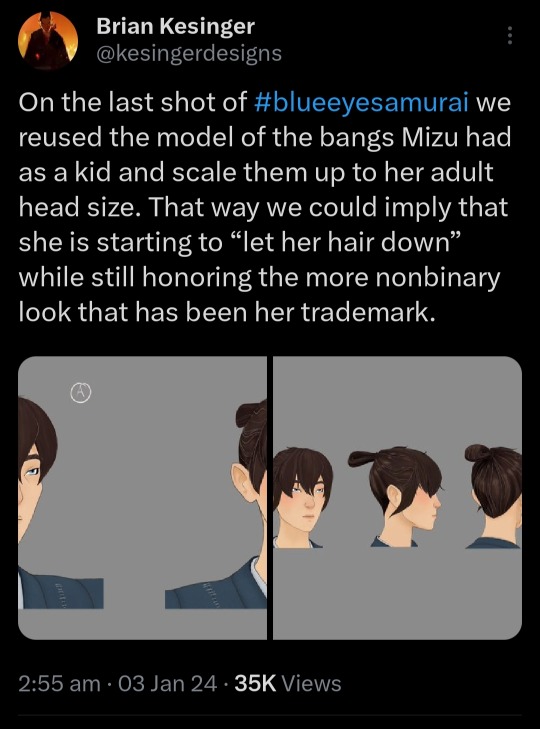
so anyway yeah that's my incredibly long rambling post.
TL;DR nonbinary mizu rights 👍🏻👍🏻👍🏻 congrats if you reached the end of this btw. also ily. unless you're a TERF in which case fuck off. ok i'm done.
#shut up haydar#fandom.rtf#meta dissertations.pdf#mizu blue eye samurai#mizu bes#blue eye samurai#blue eye samurai meta#sorry if this is redundant btw i just cant stop thinking thoughts :3#btw i am a mixed* southeast asian who is also nonbinary. just in case that's important context#by mixed* i mean i'm asian+asian but diff ethnicities lol. i dont have a white bone in my body god bless<3#my whiteness is purely learned thru cultural osmosis + bcs my parents taught me english as a first language (boooo 🍅🍅🍅)#also i live in the global south so i think EYE know a thing or two about being gnc in a society of rigid awful gender roles‼️#so likeee i think its ridiculous that its an either-or thing#mizu can be nonbinary while still being a woman of colour ¯\_(ツ)_/¯#also ummm as much as i love queer themes and gay people i wish people would talk more about the racial otherness / community aspect#as mentioned in the post above#you don't need to read bhabha's whole book btw but just take a look at some of his ideas and you'll get what im talking about#like the fact that the fandom mostly ignores those themes in the story makes me feel like :( :/#cuz to me THATS the thing that spoke to me most and its a shame that its just not talked about enough#i mean i know why thats likely the case. but still.#whoops im rambling again 🤪
77 notes
·
View notes
Text
saw tags on @lottieurl ‘s post and now I find myself also asking the question what does saira think about gay marriage. she hates straight marriage because of its patriarchal origins and family trauma ofc… does it extend to gay marriage? is she talking about the Islamic concept of marriage or the social/economic model of marriage? does she distinguish between the two? does she know that there are imams who do gay marriages? does she know she wants to get gay married? to amin-
#many many thoughts#plsssssss I need to know what do you all think#in my very very humble opinion I think she is primarily talking about social/economic marriage AND the practice of Islamic marriage when it#abused and manipulated by men#i don’t know if she distinguishes between the ideal Islamic model of marriage and how it is actually practiced by human beings but I do so t#that’s my bias talking#tbh some ppl r surprised to learn that there are imams who do gay marriages so i don’t know if she knows#Possivly is it one of those situations where what she abhors from a man she would love from a woman? maybe#tbh I think she is aware of her queerness but has not accepted it specifically because of the internalized homophobia you sometimes get when#there’s already so many other things quote unquote wrong with you. or so many ways you have already failed in the eyes of society#that it is simply too overwhelming to think about exploring that part of yourself In Real Life Permanently#I’m also fully projecting bc that’s how I was with my transess I was like well this is hard so I will pretend it is not true.#saira sherwani#we are lady parts#walp
14 notes
·
View notes
Text
Theodore 'Laurie' Laurence
from Little Women by Louisa May Alcott
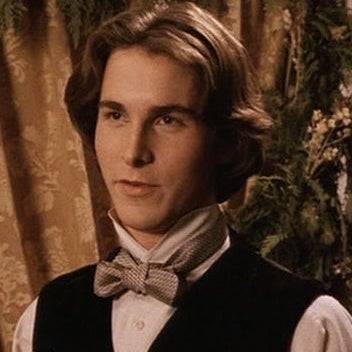
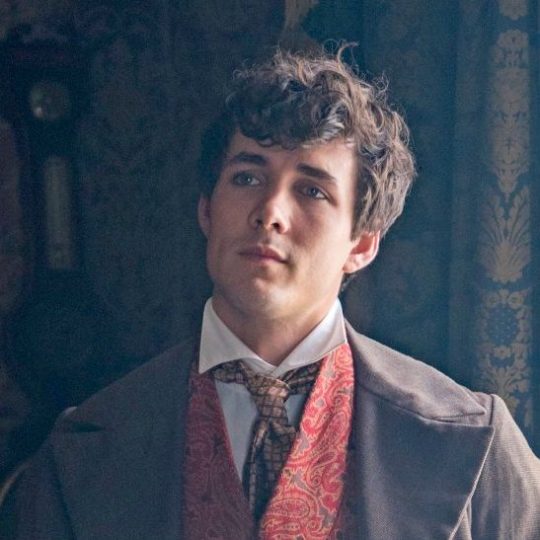

#look. EYE think that Jo and Laurie are t4t . I know society may not be ready to hear it but I need to speak my truth#laurie fits in with the march sisters far more than boys at school. laurie and jo both use nicknames associated with their opposite agab#laurie plays pretend as a male character in the pickwick club in the same way the girls do#laurie is as envious of jo's femininity as jo is of laurie's masculinity. they wear each other's clothes in the 2019 film#if laurie lived today she would be a beautiful trans woman. send post.#theodore laurence#laurie laurence#little women#little women 2019#little women 1994#little women pbs#classic literature#polls#queer#new post
10 notes
·
View notes
Text
I'm really tired of the tranny gender wars. in reality, if you go off the internet and meet a trans person, the chances are they won't be as vitriolic as the trans people are on this website. i think the average transfemme you meet at the local queer club won't say transmascs are the sole aggressors of transfemmes, and the trans guy you see in the grocery store doesn't think trans women are the cause of transmasc invisibility. people tend to be a lot nicer than they are online. i'm tired of the infighting when we have much bigger issues than whatever squabbles we have amongst ourselves. Honestly, the whole thing is fed shit as far as i'm concerned.
#i will admit transfemmes get the brunt of the hate and vitriol#especially twoc#but to completely ignore the unique challenges than transmasc people face is sticking your head in the sand#we still face misogyny despite being “men” we are still women in the eyes of most cis society#i don't like the weird posts by alot of the transandrophobia guys especially the misogyny and weird mra tone#but it shouldn't be ignored that a lot of them are them queer trans men suffering from the misogyny of the gay community#transandrophobia#transmisogyny
6 notes
·
View notes
Text
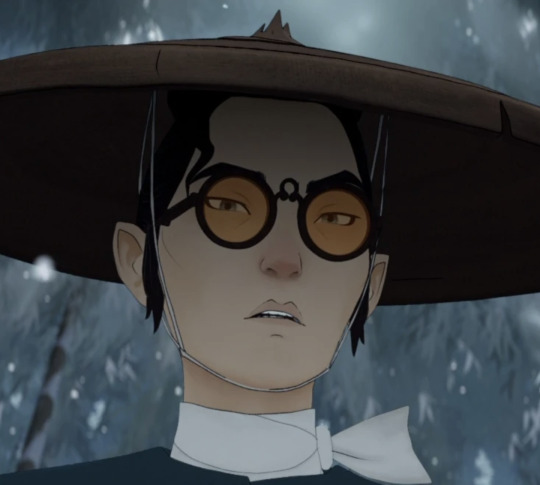
I watched all eight episodes of season 1 of Blue Eye Samurai over the weekend. I then went browsing because I wanted to read some online reviews of the show to see what people were thinking of it and also because I wanted to interact with gifs and art, as the series is visually stunning.
Yet, in my search for opinions on the show, I came across several points I'd like to address in my own words:
Mizu’s history and identity are revealed piece-by-piece and the “peaches” scene with Mizu and Ringo at the lake is intended to be a major character reveal. I think it’s weird that some viewers got angry over other viewers intentionally not gendering Mizu until that reveal, rather than immediately jumping to gender the character as the other characters in the show do. The creators intentionally left Mizu’s gender and sexuality ambiguous (and quite literally wrote in lines to lead audiences to question both) to challenge the viewer’s gut assumption that this lone wolf samurai is a man. That intentional ambiguity will lead to wide and ambiguous interpretations of where Mizu fits in, if Mizu fits in at all. But don't just take my word for this:
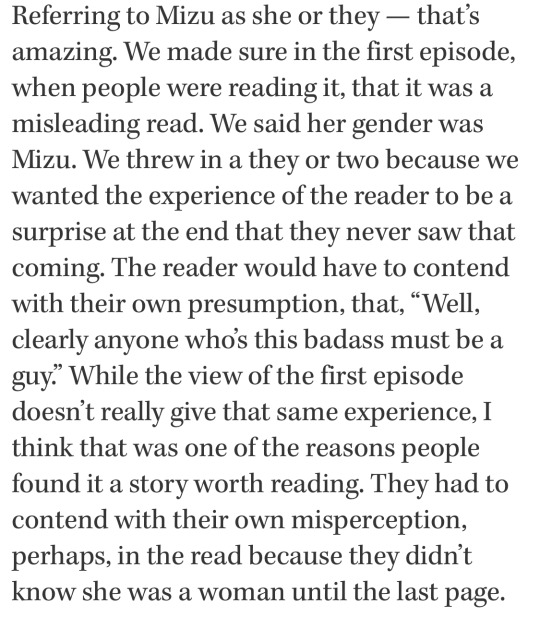
Re: above. I also think it’s weird that some viewers got upset over other viewers continuing to acknowledge that Mizu has a very complicated relationship with her gender, even after that reveal. Canonically, she has a very complicated relationship with her identity. The character is intended to represent liminality in identity, where she’s often between identities in a world of forced binaries that aren’t (widely) socially recognized as binaries. But, again, don’t just take my word for this:
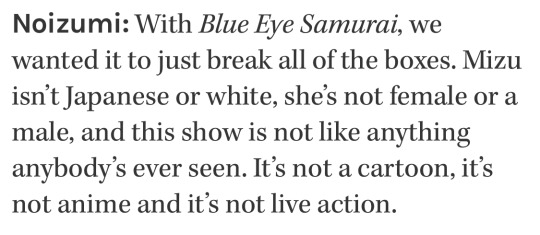
Mizu is both white and Japanese, but she is also not white and not Japanese simultaneously (too white to be Japanese and too Japanese to be white). She’s a woman and a man. She’s a man who’s a woman. She’s also a woman who’s not a woman (yet also not quite a man). But she’s also a woman; the creators said so. Mizu was raised as a boy and grew into a man, yet she was born a girl, and boyhood was imposed upon her. She’s a woman when she’s a man, a man when she’s a man, and a woman when she’s a woman.
Additionally, Mizu straddles the line between human and demon. She’s a human in the sense she’s mortal but a demon in the sense she’s not. She's human yet otherworldly. She's fallible yet greatness. She's both the ronin and the bride, the samurai and the onryō. In short, it’s complicated, and that’s the point. Ignoring that ignores a large part of her internal character struggle and development.
Mizu is intended to represent an “other,” someone who stands outside her society in every way and goes to lengths to hide this “otherness” to get by. Gender is a mask; a tool. She either hides behind a wide-brimmed hat, glasses, and laconic anger, or she hides behind makeup, her dress, and a frown. She fits in nowhere, no matter the identity she assumes. Mizu lives in a very different time period within a very different sociocultural & political system where the concept of gender and the language surrounding it is unlike what we are familiar with in our every-day lives. But, again, don’t just take my word for this:
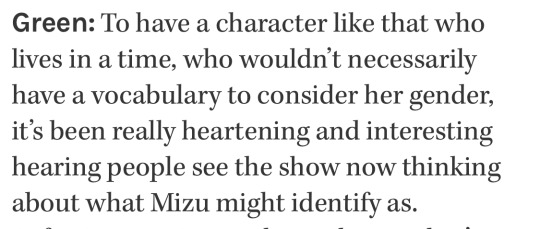
It’s also weird that some viewers have gotten upset over the fact women and queer people (and especially queer women) see themselves in Mizu. Given her complicated relationship with identity under the patriarchy and colonial violence, I think Mizu is a great character for cis-het women and queer folks alike to relate to. Her character is also great for how she breaks the mold on the role of a biracial character in narratives about identity (she’s not some great bridge who will unite everyone). It does not hurt anyone that gender-fluid and nonbinary people see themselves in Mizu's identity and struggle with identity. It does not hurt anyone that lesbians see themselves in the way Mizu expresses her gender. It does not hurt anyone that trans men see themselves in Mizu's relationship with manhood or that trans women can see themselves in Mizu when Mama forces her to be a boy. It's also really cool that cis-het women see themselves in Mizu's struggles to find herself. Those upset over these things are missing critical aspects of Mizu's character and are no different from the other characters in the story. The only time Mizu is herself is when she’s just Mizu (“…her gender was Mizu”), and many of the other characters are unwilling to accept "just Mizu." Accepting her means accepting the complicatedness of her gender.
Being a woman under the patriarchy is complicated and gives women a complicated relationship with their gender and identity. It is dangerous to be a woman. Women face violence for being women. Being someone who challenges sex-prescribed norms and roles under patriarchy also gives someone a complicated relationship with their identity. It is dangerous to usurp gender norms and roles (then combine that with being a woman...). People who challenge the strict boxes they're assigned face violence for existing, too. Being a racial or ethnic minority in a racially homogeneous political system additionally gives someone a complicated relationship with their identity. It is dangerous to be an ethnic minority when the political system is reproduced on your exclusion and otherness. They, too, face violence for the circumstances of their birth. All of these things are true. None of them take away from the other.
Mizu is young-- in her early 20s-- and she has been hurt in deeply affecting ways. She's angry because she's been hurt in so many different ways. She's been hurt by gender violence, like "mama's" misogyny and the situation of her birth (her mother's rape and her near murder as a child), not to mention the violent and dehumanizing treatment of the women around her. She's been hurt by racial violence, like the way she has been tormented and abused since childhood for the way she looks (with people twice trying to kill her for this before adulthood). She's been hurt by state-sanctioned violence as she faces off against the opium, flesh, and black market traders working with white men in contravention of the Shogun's very policies, yet with sanction from the Shogun. She's been hurt by colonial violence, like the circumstances of her birth and the flood of human trafficking and weapons and drug trafficking in her country. She's had men break her bones and knock her down before, but only Fowler sexually differentiated her based on bone density and fracture.
Mizu also straddles the line between victim and murderer.
It seems like Mizu finding her 'feminine' and coming to terms with her 'female side' may be a part of her future character development. Women who feel caged by modern patriarchal systems and alienated from their bodies due to the patriarchy will see themselves in Mizu. They understand a desire for freedom that the narrow archetypes of the patriarchy do not afford them as women, and they see their anger and their desire for freedom in Mizu. This, especially considering that Mizu's development was driven by one of the creators' own experiences with womanhood:
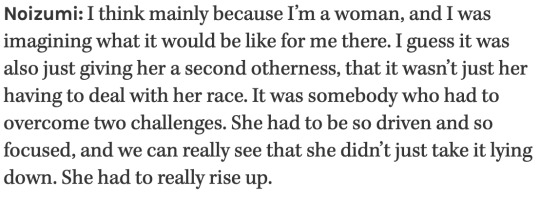
No, Mizu does not pass as a man because she "hates women" or because she hates herself as a woman or being a woman. There are actual on-screen depictions of Mizu's misogyny, like her interactions with Akemi, and dressing like a man is not an instance of this. Mizu shows no discomfort with being a woman or being seen as a woman, especially when she intends to pass herself as and present as a woman. Mizu also shows the women in the series more grace and consideration than any man in the show, in whatever capacity available to her socially and politically, without revealing herself; many of the women have remarked that she is quite unlike other men, and she's okay with that, too.
When she lives on the farm with Mama and Mikio, Mizu shows no discomfort once she acclimates to the new life. But people take this as conclusive evidence of the "only time" she was happy. She was not. This life was also a dance, a performance. The story of her being both the ronin and the onryō revealed to the audience that this lifestyle also requires her to wear a mask and dance, just as the bride does. This mask is makeup, a wedding dress, and submission, and this performance is her gender as a wife. She still understands that she cannot fully be herself and only begins to express happiness and shed her reservation when she believes she is finally safe to be herself. Only to be betrayed. Being a man is her safety, and it is familiar. Being a boy protected her from the white men as a child, and it might protect her heart now.
Mizu shows no discomfort with being known as a woman, except when it potentially threatens her goals (see Ringo and the "peaches" scene). She also shows no discomfort with being known as, seen as, or referred to as a man. As an adult, she seems okay- even familiar- with people assuming she's a man and placing her into the role of a man. Yet, being born a girl who has boyhood violently imposed upon her (she did not choose what mama did to her) is also an incredibly important part of her lived experience. Being forced into boyhood, but growing into a man anyway became part of who she is. But, being a man isn’t just a part of who she became; it’s also expedient for her goals because men and women are ontologically different in her world and the system she lives under.
She's both because she's neither, because- ontologically- she fits nowhere. When other characters point out how "unlike" a man she is, she just shrugs it off, but not in a "well, yeah, because I'm NOT a man" sort of way, but in an "I'm unlike anyone, period," sort of way. She also does not seem offended by Madam Kaji saying that Mizu’s more man than any who have walked through her door.
(Mizu doesn’t even see herself as human, let alone a woman, as so defined by her society. And knowing that creators have stated her future arc is about coming into her “feminine era” or energy, I am actually scared that this show might fall into the trope of “domesticating”/“taming” the independent woman, complete with an allegory that her anger and lack of human-ness [in Mizu’s mind] is a result of a woman having too much “masculine energy” or being masculine in contravention of womanness.)
Some also seem to forget that once Mama and Mikio are dead, no one knows who she is or where she came from. They do not have her background, and they do not know about the bounty on her (who levied the bounty and why has not yet been explained). After their deaths, she could have gone free and started anew somehow. But in that moment, she chose to go back to life as a man and chose to pursue revenge for the circumstances of her birth. Going forward, this identity is no longer imposed upon her by Mama, or a result of erroneous conclusions from local kids and Master Eiji; it was because she wanted people to see her as a man and she was familiar with navigating her world, and thus her future, as a man. And it was because she was angry, too, and only men can act on their anger.
I do think it important to note that Mizu really began to allow herself to be vulnerable and open as a woman, until she was betrayed. The question I've been rattling around is: is this because she began to feel safe for the first time in her life, or is this part of how she sees women ontologically? Because she immediately returns to being a man and emotionally hard following her betrayal. But, she does seem willing to confide in Master Eiji, seek his advice, and convey her anxieties to him.
Being a man also confines Mizu to strict social boxes, and passing herself as a man is also dangerous.
Mizu doesn't suddenly get to do everything and anything she wants because she passes as a man. She has to consider her safety and the danger of her sex being "found out." She must also consider what will draw unnecessary attention to her and distract her from her goals. Many viewers, for example, were indignant that she did not offer to chaperone the mother and daughter and, instead, left them to the cold, only to drop some money at their feet later. The indignity fails consider that while she could bribe herself inside while passing as a man, she could not bribe in two strangers. Mizu is a strange man to that woman and does not necessarily have the social position to advocate for the mother and daughter. She also must consider that causing small social stirs would distract from her goals and draw certain attention to her. Mizu is also on a dangerous and violent quest.
Edo Japan was governed by strict class, age, and gender rules. Those rules applied to men as well as women. Mizu is still expected to act within these strict rules when she's a man. Being a man might allow her to pursue revenge, but she's still expected to put herself forward as a man, and that means following all the specific rules that apply to her class as a samurai, an artisan (or artist), and a man. That wide-brimmed hat, those orange-tinted glasses, and her laconic tendencies are also part of a performance. Being a boy is the first mask she wore and dance she performed, and she was originally (and tragically) forced into it.
Challenging the normative identities of her society does not guarantee her safety. She has limitations because of her "otherness," and the transgression of sex-prescribed roles has often landed people in hot water as opposed to saving them from boiling. Mizu is passing herself off as a man every day of her life at great risk to her. If her sex is "found out" on a larger scale, society won’t resort to or just start treating her as a woman. There are far worse fates than being perceived as a woman, and hers would not simply be a tsk-tsk, slap on the wrist; now you have to wear makeup. Let's not treat being a woman-- even with all the pressures, standards, fears, and risks that come with existing as a woman-- as the worst consequence for being ‘found out’ for transgressing normative identity.
The violence Mizu would face upon being "found out" won’t only be a consequence of being a "girl." Consider not just the fact she is female and “cross-dressing” (outside of theater), but also that she is a racial minority.
I also feel like many cis-het people either ignore or just cannot see the queerness in challenging gender roles (and thus also in stories that revolve around a subversion of sex-prescribed gender). They may not know how queerness-- or "otherness"-- leads to challenging strict social stratifications and binaries nor how challenging them is seen by the larger society as queer ("strange," "suspicious," "unconventional," even "dishonorable," and "fraudulent"), even when "queerness" (as in LGBTQ+) was not yet a concept as we understand it today.
Gender and sexuality- and the language we use to communicate who we are- varies greatly across time and culture. Edo Japan was governed by strict rules on what hairstyles, clothes, and weapons could be worn by which gender, age, and social group, and this was often enshrined in law. There were specific rules about who could have sex with whom and how. These values and rules were distinctly Japanese and would not incorporate Western influences until the late 1800s. Class was one of the most consequential features to define a person's fate in feudal Japan, and gender was quite stratified. This does not mean it's inappropriate for genderqueer people to see themselves in Mizu, nor does this mean that gender-variant identities didn’t exist in Edo Japan.
People in the past did not use the same language we do today to refer to themselves. Example: Alexander The Great did not call himself a "bisexual." We all understand this. However, there is a very weird trend of people using these differences in language and cultures across time to deny aspects of a historical person's life that societies today consider taboo, whether these aspects were considered taboo during that historical time period or not. Same example: people on Twitter complaining that Netflix "made" Alexander The Great "gay," and after people push back and point out that the man did, in fact, love and fuck men, hitting back with "homosexuality wasn't even a word back then" or "modern identity didn't exist back then." Sure, that word did not exist in 300s BCE Macedonia, but that doesn't mean the man didn't love men, nor does that mean that we can't recognize that he'd be considered "queer" by today's standards and language.
Genderqueer, as a word and as the concept is understood today, did not exist in feudal Japan, but the people did and feudal Japan had its own terms and concepts that referred to gender variance. But while the show takes place in Edo Japan, it is a modern adult animation series made by a French studio and two Americans (nationality). Mizu is additionally a fictional character, not a historical figure. She was not created in a vacuum. She was created in the 21st century and co-written by a man who got his start writing for Sex in the City and hails from a country that is in the midst of a giant moral panic about genderqueer/gender-variant people and gender non-conforming people.
This series was created by two Americans (nationality) for an American company. In some parts of that country, there are laws on the book strictly defining the bounds of men and women and dictating what clothes men and women could be prosecuted for wearing. Changes in language and identity over time mean that we can recognize that if Mizu lived in modern Texas, the law would consider her a drag performer, and modern political movements in the show creators' home country would include her under the queer umbrella.
So, yeah, there will also be genderqueer people who see themselves in Mizu, and there will be genderqueer fans who are firm about Mizu being queer to them and in their “headcanons.” The scene setting being Edo Japan, does not negate the modern ideas that influence the show. "Nonbinary didn't exist in Edo Japan" completely ignores that this show was created to explore the liminality of modern racial, gender, class, and normative identities. One of the creators was literally inspired by her own relationship with her biracial identity.
Ultimately, the fact Mizu, at this point in her journey, chooses to present and pass as a man and the fact her presented gender affects relationship dynamics with other characters (see: Taigen) gives this story a queer undertone. And this may have been largely unintentional: "She’s a girl, and he’s a guy, so, of course, they get together," < ignoring how said guy thinks she’s a guy and that she intentionally passes herself as a guy. Audiences ARE going to interpret this as queer because WE don’t live in Edo-era Japan. And I feel like people forget that Mizu can be a woman and the story can still have queer undertones to it at the same time.
#Blue Eye Samurai#‘If I was transported back in time… I’d try to pass myself off as a man for greater freedom.’#^^^ does not consider the intersection of historically queer existence across time with other identities (& the limitations those include)#nor does it consider the danger of such an action#I get it. some come to this conclusion simply because they know how dangerous it is to be a woman throughout history.#but rebuking the normative identities of that time period also puts you at great risk of violence#challenging norms and rules and social & political hierarchies does not make you safer#and it has always been those who exist in the margins of society who have challenged sociocultural systems#it has always been those at greatest risk and who've faced great violence already. like Mizu#Anyway... Mizu is just Mizu#she is gender queer (or gender-variant)#because her relationship with her gender is queer. because she is gender-variant#‘queer’ as a social/political class did not exist. but people WE understand as queer existed in different historical eras#and under different cultural systems#she’s a woman because queer did not exist & ‘woman’ was the sex caste she was born into#she’s also a woman because she conceptualizes herself as so#she is a woman AND she is gender-variant#she quite literally challenges normative identity and is a clear example of what sex non-conforming means#Before the actual. historic Tokugawa shogunate banned women from theater#there were women in the theater who cross-dressed for the theater and played male roles#so I’m also really tired of seeing takes along the lines of: ‘Edo Japan was backwards so cross dressers did’t exist then!’#like. please. be more transparent won’t you?
21 notes
·
View notes
Text
I have so many problems with karamo but the s8 finale… he sees an asian woman who has severe trauma surrounding her father due to (some) asian culture(s) not allowing people to properly talk to their parents about their emotions or issues with them because that could be seen as disrespectful, oui? so she hasn’t spoken to him after her mother died and that is hard, yes?
and this man chooses to surprise her in the car (after making her cry) with an unannounced FaceTime call with said father, which forces her to immediately talk about why she’s upset with him after three years of not speaking??????? without being prepared, without knowing what to say to a stubborn elderly asian man who never learned to deal with his emotions and fucked up because of it? REALLY?
the LEAST he could have done was tell her in advance so she could write it down for herself and so she could be prepared
sure they talked. sure they made a start. but at what cost. what violence did this wreak on her for no reason. jesus CHRIST THIS MAN ANGERS ME SO MUCH
#queer eye#spoilers#I guess#there’s maybe (1) season in all 8 where I wasn’t pissed at Karamo’s ‘therapy’#this man is the LAST on this entire list I would want to talk to I would just throw everything on Tan while we shop ngl#I love this show DONT get me wrong but SOOOOOOO many times karamo has the right idea but the complete wrong execution#also what the FUCK was that whole thing in dentons episode?#he tells you the school for the deaf is at risk of closing down due to funding#aka big societal capitalistic issue that speaks volumes about what’s wrong with our society#and karamo decides to hit him with ? you’re scared to fail? You’re too hard on yourself#NO SHIT HES SCARES TO FAIL THERES CLOSE TO NONE SPORT EDUCATION SCHOOLS FOR THE HARD OF HEARING#AND HES TRYING TO SAVE THE ONLY ONE STANDING IN THE AREA NO SHIT HES SCARED#HELLO?????????#Don’t even get me started on that episode where he suddenly pulled in the guy who put the hero in a wheel chair by shooting him#without announcement#(I forgot their names it’s been a while apologies)#like sorry#my dude you can’t do this that’s insanely#triggering#??!?!??????!??!?#anyways. whew.#I bawled my eyes out at the season finale like it ticked all the boxes just now but fucking karamo#I swear to god.#be better try harder maybe ask an actual therapist#fuck me dude#it’s for the best I was never selected for this show because oh my god he triggers my fight instinct#would make for good tv though I guess
24 notes
·
View notes
Text
it's honestly very fascinating and sobering to read tumblr discourse about the relationship between drag and transmisogyny when you're a transmasc drag king and many of the drag queens that you personally know and interact with are transfem
#it's obviously not my discourse to comment on and i don't speak for every drag performer but i love reading other people's thoughts on it#bc i'm at the point where i assume every drag performer i meet - king queen or whatever - is some form of trans because SO MANY of us are#so it's eye-opening to read posts where trans people outside the drag scene assume the reverse#it's a perspective that makes A LOT of sense given how there IS tranmisogynistic drag out there & how society talks about drag#grungepo thoughts#grungepo does drag#just queer things#just trans things
5 notes
·
View notes
Text
my 5th grade band director told us when we were choosing instruments 'there are no easy instruments, there are hard instruments and hardER instruments' and i feel like that applies to all these conditions and disorders people fight about like none of this shit is 'destigmatized' there's simply 'stigmatized' and 'more stigmatized'
#there's more nuance to it obv when it comes to things like ppl acting like certain conditions are terminal when they objectively arent etc#but on the whole society does not accept disabled people#and whatever things y'all think are 'mild' aren't treated as such in the eyes of society especially when the person is visibly queer/poc etc
4 notes
·
View notes
Text
just saw someone i follow reblog a post that called bi lesbians/mspec lesbians bigots… checked the dni of the person who made the post and sure enough they’re an exclus. needless to say the exclus has been blocked and that person i was following has been unfollowed. kill the cop in your heads y’all, it doesn’t fucking matter what terms someone uses for their identity. and bi women were also considered lesbians before terfs kicked them out. so.
#em rambles#anti exclusionist#people are fucking stupid#the post in question was about how predstrogen- (the trans lady who was terminated off the platform for being trans)#-was supposedly a lesbophobe and continually slandered the person making the post for months last year#i don’t trust anything that person said though#calling mspec lesbians bigots HOW IS IT BIGOTED TO KILL THE COP IN YOUR HEAD THAT POLICES IDENTITY WORDS#THE WHOLE POINT OF BEING QUEER IS TO EXIST OUTSIDE THE BINARY.#IMPOSING NEW BINARIES AND STRICT DEFINITIONS OF WORDS MAKES US NO BETTER THAN THE CISHETERONORMATIVE SOCIETY WE LIVE IN.#so fucking stupid#look. in the eyes of some homophobe we are all the same no matter the terms we use to identify ourselves.#how are we supposed to stand up to the queerphobes who want to get rid of us when we can’t even agree on what someone’s called#let them use the terms they want. at the end of the day it doesn’t matter#solidarity is what’s important because what queerphobe cares if someone’s bi or a lesbian or a bi lesbian or whatever#we’re not each other’s opponents here. we’re supposed to support each other.#pro mspec lesbian#exclus dni#exclusionist dni#terf dni
14 notes
·
View notes
Text
the valyrians in the days of old valyria were canonically just as accepting as the rhoynar were with queerness. btw
#my source: the empire of ash#like. being in a same gender/same sex relationship just. wasnt that big of a deal & it wasnt even seen as separate it had no labels lmao#ppl were allowed to be in same gender relationships in valyria no one blinked an eye. i'd imagine that'd apply to trans characters too#BUT!!!! that doesnt automatically mean that valyria is all of a sudden a great society bc they. yknow. practiced slavery & bloodmagic lmao#its a lot like rome was. it's not like in westeros where bc of the faith of the seven you had to hide that you're queer ykwim#so that's. one of the reasons why r.haena straight up doesnt give a fuck & is openly a lesbian & in a same gender relationship w/ elissa.#the valyrians & the summer islanders were v sex positive & shared that in common & so did the rhoynar & possibly the first men !#bc remember the first men didnt say anything about how queerness is bad ! they sometimes have gnc characters !#so the 'my muse has 2 hide that theyre gay/queer' is. v much an andal/faith of the seven thing not a valyrian/summer islander/dornish one !#ooc.
4 notes
·
View notes
Text
Highlights of MBS Queer Eye AU
In which Nicholas is the hero
The person who has the most work cut out for them is definitely Karamo. Nicholas has some fucked up trauma. The scenes with the two of them are just like Karamo asking Nicholas what he thinks about himself as a person and Nicholas being like "yeah I am a piece of trash and deserve nothing"
Conversely, Tan has the least work to do, because Nicholas's wardrobe already slaps. I DO HOWEVER think Tan would talk to Nicholas about his body image and maybe try to encourage outfits that don't hide his body as much. His gay professor style is great, but maybe he could work on not feeling like he can't even show skin or wear something that would emphasize his insecurities. Tan also tries to get him to improve his posture but has minimal success there.
Jonathan puts Nicholas on the curly girl routine or whatever else so his curls are healthy <3 and also dyes his hair neon green because why fucking not and doing something conventionally attractive would not work out anyway because Nicholas is not going to bother with upkeep.
Number Two refuses to let Bobby do any major renovations without her because she asserts her dominance as the more skilled woodworker. So Bobby just helps them clean and do repairs and maybe add a new bedroom or something since they're always adopting new family members.
Antoni has to work with Karamo to convince Nicholas that he's not too worthless of a person to deserve nice food, because he does have the skills to cook and helps organize meals for the others, but he doesn't care as much about his own nutrition. So it's less about teaching him how to cook and more about being like "hey dude you actually deserve meals even if it's not just because the others are here, you deserve it even if it's just for you"
Misc: Kate and Constance are absolutely delighted by the opportunity to be menaces on TV. I imagine the part of the episode where they're introducing the hero would be fucking hilarious because it's like "this man is a genius who solved the emergency, has 4 adopted children and also lives with his four adult found family members. He was nominated by Number Two [cut to shot of Number Two doing something unhinged]. Here we are at their house. Oh, but first we have to go through this maze.
24 notes
·
View notes
Text
it's always weird to me when people have space societies automatically take on patriarchal/heteronormative norms, like. they're in space! they can be whatever
#all these characters are queer and it's just a fact of life. no big deal.#there's no reason jyn and cassian couldn't both take each other's names and hyphenate even if that's not something you see people do in OUR#society a lot etc etc#like al ewing had the right idea writing his gotg comic because polycules could totally be a thing in space that no one would bat an eye at#think bigger!!!!
7 notes
·
View notes